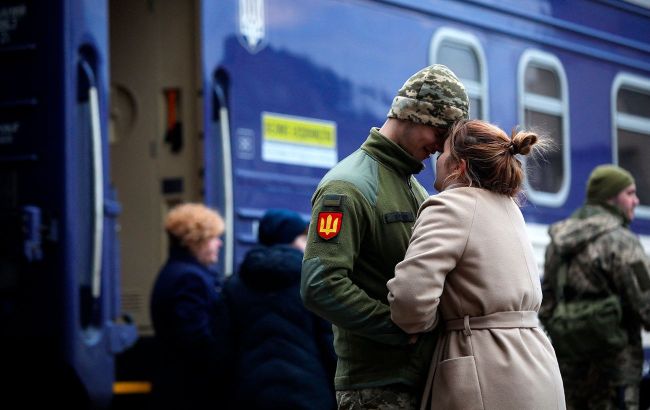Ukraine launches military obligations registry: How it will affect mobilization
 The launch of the Oberih registry should simplify mobilization (Getty Images)
The launch of the Oberih registry should simplify mobilization (Getty Images)
Ukraine has launched an electronic register of persons liable for military service called Oberih. The Ministry of Defense, the General Staff, the Territorial Recruitment Centre (TRCs), and other structures have access to it, while those liable for military service can only check their data by contacting the Territorial Recruitment Centre.
Sources used: interviews with Volodymyr Fitio, spokesperson for the Land Forces of the Armed Forces of Ukraine, and Mykhailo Fedorov, Deputy Prime Minister for Digital Transformation, for RBC-Ukraine, an interview with Deputy Defense Minister Kateryna Chornohorenko for DOU, draft law No. 10062, and a statement by Deputy Defense Minister Natalia Kalmykova.
What is Oberih and why is it needed?
The history of the Unified state register of conscripts, individuals liable for military service, and reservists began in March 2017 with the adoption of the relevant law. The register was formally launched in March 2022 but without a complete database.
When Rustem Umerov took office as Minister of Defense in early September, he said that the point of Oberih was to fully digitalize the processes to make everything digital: from the e-ticket to the documents of military medical commissions. In addition, the registry will eliminate any corruption risks.
The Unified register is an electronic information system for collecting, storing, processing, and using data created to ensure the military registration of Ukrainian citizens.
Its tasks are:
- maintaining military records
- planning and implementation of measures for mobilization and recruitment
- providing information to military pensioners and family members of the deceased with information on military registration
The administrators of the register are the TRCs and operational commands. It is filled in by the District and City Recruitment Centres.
It is expected that Oberih will help identify Ukrainians who are not registered for military service more quickly.
At what stage and to what extent is the register filled?
Back in the fall, the Ukrainian media reported that Oberih was actually ready and that most Ukrainians liable for military service were already in the register. This was facilitated, in part, by the digitalization of processes through the Diia service.
In an interview with RBC-Ukraine, Land Forces spokesperson Volodymyr Fitio says that Oberih has already started working.
"But it is not yet synchronized with other state registers. When the relevant draft law is passed, in most cases there will be no need for warning measures because different databases will be synchronized," he says.
Kateryna Chornohorenko, Deputy Minister of Defense for Digital Development, Digital Transformation and Digitalization, clarifies that Oberih is a database of individuals liable for military service who can be mobilized. And there is no data on active military personnel there.
She compares it to the passport register or the unified demographic register with the personal information of Ukrainians. Data is currently being exchanged with large state registers.
"The planned work on it (Oberih - ed.) has been completed, we have increased the register by 750 thousand records, and verified the data up to 88%," Chornohorenko adds.
What will the launch of the register of individuals liable for military service change?
After the databases are synchronized, in most cases there will be no need for notification measures.
"We will see, for example, that a citizen was registered in Kyiv, but now he works in Lviv because the tax on his salary - personal income tax - is paid to the Lychakiv district of Lviv. Accordingly, then it will be a simple matter of addressing the owner of his company, of any form of ownership, that this citizen needs to come to the Lychakiv TRC of Lviv. And the head of the enterprise will be obliged to personally deliver this person liable for military service to the Territorial Recruitment and Social Support Center," says Volodymyr Fitio.
Previously, the electronic database in the TRC allowed for the notification of people anywhere in the country, meaning, for example, a person from Sumy could be served a summons in Odesa. Now, a digitized case can be seen by a TRC in another region. So far, there is no synchronization with other registries. As soon as it works, all the issues with TRC representatives visiting sports clubs, and restaurants, and serving summonses at checkpoints will disappear.
"This will simplify the mobilization of resources, both human and transport, and much more. We are currently spending a lot of human resources on the implementation of warning measures," adds the representative of the Land Forces.
Kateryna Chornohorenko notes that Oberih is designed to reduce corruption, and the possibility of manipulating data, and to avoid cases when summonses are repeatedly sent to those who are already at war.
"Our end user is not only a person liable for military service, but also an employee of the Territorial Recruitment and Social Support Center, who must be a superman in working with data, working with people, and be service-oriented," she says.
In addition, she says, the Cabinet of Ministers is proposing to launch the possibility of registering for military service through administrative service centers. And new electronic services will be launched based on Oberih, for example, to book people liable for military service.
What data is entered into Oberih and where is it taken from?
The register contains information about all conscripts, persons liable for military service, and reservists aged 18 to 60 (from 17 years old if draft law No. 10062 is passed).
It includes the following data:
- full name, date and place of birth, gender, citizenship
- place of residence and stay
- marital status (presence of children)
- education, profession, place of work
- state of health
- military specialty
The register also includes information about parents, details of domestic and foreign passports, TIN, digitized face images, data on travel abroad, criminal records, etc.
If the Verkhovna Rada passes Bill 10062, this list will be supplemented with phone numbers, email addresses, information on foreign languages, the right to own a weapon, and a driver's license. As of December 2023, the document had passed only the first reading.
Oberih is filled with data from other registers. At the first stage, the system interacts with the databases of the Ministry of Finance, the Ministry of Internal Affairs, the Ministry of Education and Science, and the State Judicial Administration. At the next stage, information is exchanged with the registers of the Pension Fund, the Ministry of Health, the Ministry of Social Policy, and other agencies.
One of the key registers is the Register of Individual Taxpayers. It has been collecting information since 1994 and is the most complete and capable of verifying data in other registers.
Oberih does not require the consent of individuals liable for military service to process personal data. At the same time, Ukrainians must provide only reliable information about themselves.
How Oberih works and who has access?
Before the launch of Oberih, all information about a person in the military registration and enlistment office was stored in folders. The first task was to digitize the folders and enter them into the system so that the information could be available online.
"And when you come to the military registration and enlistment office, it should be in your file and you shouldn't have to search for this information. Then, in real time, the Armed Forces of Ukraine will know what is happening with mobilization, how many people are liable for military service, and where they studied, so that they can make some kind of forecast," Mykhailo Fedorov, Deputy Prime Minister for Digital Transformation, explains to RBC-Ukraine.
We are talking about automating the work of the TRCs, which will remove queues, windows, etc. On the other hand, we are talking about qualitative data that will allow us to make decisions about how many people to mobilize, who is needed, and so on.
According to Fedorov, now, when a man gets married, he has to notify the military registration and enlistment office. The registry will allow receiving such data automatically. That is, there is no need to come to the military registration and enlistment office every time to notify it of such changes.
In simple words, there is no interface between people and military commissariats through the registry. Oberih only automates communication between a TRC employee and a person liable for military service, as there is no need to run and take a folder with documents.
The Ministry of Defense, the General Staff of the Armed Forces, the Security Service of Ukraine, the Foreign Intelligence Service, and the TRC have access to the register.
If a person's data is entered for the first time, a separate entry number is generated in Oberih, and the time, date, and information about who made the entry are recorded. Data in electronic cards about each person must be stored for life and deleted after 105 years from the date of birth.
The TRC operator does not have direct access to other registries, but only generates a specific request through Oberih. For example, if a student needs to bring a certificate from his or her place of study, he or she must first contact the university, get a document with a seal, and then go to the TRC. The Unified register will allow, upon request, to check whether the person is studying full-time and is entitled to a deferment.
As for the access of persons liable for military service to the register, today there is only an opportunity to check information about themselves. To do this, you need to personally apply to the TRC and submit a written request.
Draft law No. 10062 contains a provision that persons liable for military service will have access to Oberih through an electronic cabinet. Only then will it be possible to remotely check the data and submit information about themselves to the TRC.
If the data is not in the registry, will the TRCs know about this person?
Not quite so. According to Deputy Defense Minister Natalia Kalmykova, it is possible to identify persons liable for military service even if they have not updated their data in the TRC or are not in Oberih.
"Even if a person is not in the Register of Individuals Liable for Military Service, there are other registers that we can use to identify them anyway," she said, noting that everyone in the modern world leaves a digital footprint.
For example, the Ministry of Health will transfer data on phone numbers, e-mails, health information - everything that a family doctor has entered into the database.
The Ministry of Internal Affairs will transfer the following information:
- presence (absence) of a criminal record
- information on vehicle ownership
- information on driver's license
- information on weapons permits
The State Tax Service will provide information on employment (company code, place of work, position). The Ministry of Education will provide information about where a person is studying, when he or she graduates, or whether he or she is pursuing a second higher education.
In addition, the system will have an electronic cabinet, an electronic military ID card, and an electronic account book. Thanks to data exchange, Oberih will display what services a person uses and where he or she is located. According to Kalmykova, people liable for military service will be able to be tracked online.
"Such measures are extremely necessary. With the help of the Oberih system, we will know what services a person uses and where they are. We will also have all the information that is available in the Diia app and even more: car purchase, where the person works, vaccinations, whether they are getting a second higher education, where they live, information about their parents and marital status," she adds.

